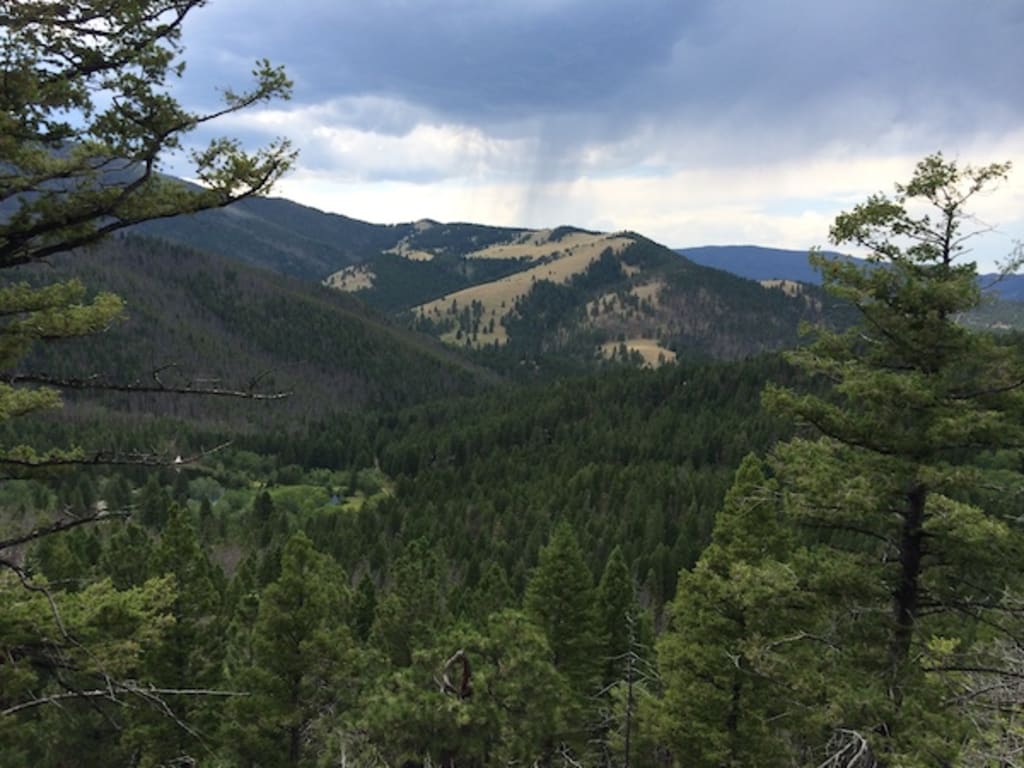Fear of Wide-Open Spaces and Recognizing Life’s Fragility
Nature offered a different lesson for me than I wanted

“The trails around here are easy to follow,” the retreat facilitor told us.
"Just let us know if you’re going out, and maybe go in pairs. This trail that starts at the end of the drive is just a circle. A little over an hour; you can’t get it wrong. Let someone in the kitchen know when you’re leaving and where you’re going. If you don’t come back in time, someone will come and search for you on the four-wheeler.”
All of us guests chuckled at that last part, confident that nothing bad would happen to us.
In Montana for a women’s retreat, I was desperate for some alone time. A solo walk in nature sounded perfect. While I am in awe of nature, I don’t consider myself very nature-y. A simple circular path, though? I could do that.
I hoped Nature would give me a big hug, like a welcome home. I hoped Nature would remind me that I belonged, and would “speak to me,” as I’ve always heard others say it does.
I notified someone in the kitchen staff where I was going, as they suggested, and headed off on the trail at the end of the drive. Later, I would be very glad I did that.
The trail was less of a true trail than it was tamped-down native grasses slithering between rows of tall pines on either side. Still, in these early moments, I felt confident, strong, and independent as I breathed in the fresh air and stared up at the Montana sky.
An “hour or so,” she’d said, but I didn’t inquire more into that. Neither did I pay too close of attention to the time; two things I would wish I’d done later. But I was on this retreat to get away from schedules and timing. I wanted to immerse myself in the healing properties of nature.
At some point, the “trail” snaked up and left. A circle, I reminded myself. Shortly after that, it turned left again, and I assumed I was heading for home.
Still feeling confident, I took out my phone to take some pictures. I wanted to feel a part of all this beauty.
But, right after, a wave of fear overcame me as I realized just how massive this beauty was. I felt like I didn’t belong.
Whatever path there had been devolved further as I stepped over fallen trees and crunched through debris. Still—it was unthinkable that I missed a turn somewhere, right?
I started to panic. Logic told me I had done nothing wrong, but fear reminded me that anything was possible.
I chastised myself: I didn’t know what I was doing. I should’ve gone with a group. I should’ve watched the time. I should’ve turned back.
I thought about sitting down by a tree and waiting to be rescued. But then, how long until they’d come for me on a four-wheeler? Or was I too far off the path to even be rescued?
It’s a circle, I reminded myself. You’re going back the way you came. This has to work.
I checked my phone: no cell service, and very little battery. I shouldn’t have taken those pictures, I thought.
My body shrank into a tiny ball of panic, each thread a separate fear I’ve only in recent years been able to single out:
Have I over-estimated myself?
Have I under-estimated the great outdoors?
What about bears?
When does the sun set?
Is that a storm in the distance?
What if I die alone?
What if I die, painfully?
What if I never see my friends and family again?
To keep the fear from paralyzing me completely, I forced one foot in front of the other, my gut telling me to go straight. Turning left or right would break the circle I imagined I was still on.
Then, I came across a yurt, enclosed in a fence with a gate.
This has to be wrong, I said to myself. I must be lost. There’s no way I’m walking through private property!
This was Montana. Property owners in the woods had guns. I didn’t want to be a modern-day Goldilocks and get caught on someone else’s property.
Still…could I go there for help? For safety? What if worse came to worse?
I looked behind and around me, completely overwhelmed by my surroundings. Nothing looked friendly.
So much for getting a hug from Nature, I felt squeezed.
I looked at my phone again: one bar. It was enough.
On the way to the retreat center from the airport, I had called them for some basic directions, so the number was blessedly in my recent calls; I didn’t think I would have the battery power to do a search. I dialed.
A woman answered. Thank god. At first, she couldn’t hear me; the cell service was so spotty. I feared she would hang up as she kept repeating, “Hello, hello?” I focused on getting out the most important words: Lost. Hike.
She asked, “Okay, tell me what you see.”
I spat out the words red and yurt, since they seemed the most important.
“Oh,” she said calmly. “You’re…there. Just walk…the gate…hill, and you’ll reach…road…back to the retreat center.”
I followed these instructions, and sure enough, I had been less than five minutes away.
I was never off the path, never really lost, never truly in danger.
But, my body didn’t know that, and my mind couldn't believe it.
Even now, five years later, when I think back on this hike, my adrenaline rushes as it did that day. I don’t know how much longer I might’ve stayed up there, on the edge of that property, weighing whether or not to cross it.
A tiny amount of cell phone battery and one bar of shaky service was all that stood between me and becoming fully paralyzed in the mountains of Montana.
What if I’d not taken my phone at all?
Claustrophobia is a condition in which people are afraid of small, confined spaces. The opposite of claustrophobia, according to my searches, is agoraphobia, but this can’t be what I experienced, either, given that hiking is considered a good way to overcome agoraphobia.
Maybe there’s no name for the fear of how wide-open spaces can make us feel so small and insignificant, and how they can teach us, with detachment and silence, how fragile our lives truly are.
A few months later, still on my quest for independence, I embarked on a personal pilgrimage to Myanmar. Like I had started my hike in Montana, I felt confident.
I had booked personal transportation, too, to take me from place to place. But, just as I was getting comfortable around my first driver, it was time to change to a driver who would take me to my next location.
I got in the backseat. We exchanged a few words; he didn’t seem as talkative as my first driver. That was okay as I was tired, and we were just going to my next hotel.
But then, fear struck out of nowhere: I didn’t know how long the drive was supposed to take. And there was nothing but open space in every direction.
My driver pulled over to the side of the road, and said, “Come with me.”
What choice did I have? I got out of the car and followed him up a fairly steep embankment.
Was this it? I wondered. Was this the place he would leave me to die?
Finally, he stopped, and said, “Look at this view.”
He wasn’t kidding; it was in an incredible view of the beauty that is Myanmar. We took in the spaciousness together for a few moments, and then we walked back down the hill—him, taking my arm from time to time to help me find my step.
Now, living in Minnesota where the winters can be deadly, I never leave the house without my jacket, my purse, and some water. I realize it only takes a few things to go wrong, and I could find myself at the mercy of the elements.
Thanks to my experiences in Montana and Myanmar, I’m viscerally, acutely aware of how fragile our lives are.
Just like that, we could be taken.
We think we’re so secure. We think we’re safe. We think we can always call for help. But we’re all just a few wrong turns away from disaster. We are not invincible.
We are more dependent on each other than we think. We trust in norms and expectations, and most often, they work out. We follow directions, we take advice, we get in stranger’s cars, we board airplanes and boats, we put our trust in others. With just these things, and maybe a bit of luck, we navigate the open spaces of our lives.
Anything could happen, at any time. I have felt this truth in my bones. It’s not a mantra for me, it’s a known truth.
About the Creator
Keri Mangis
Writer and philosopher. Deep end only. I write about culture/society, spirituality & personal growth, & empowerment. Award-winning author of Embodying Soul: A Return to Wholeness. https://kerimangis.com






Comments
There are no comments for this story
Be the first to respond and start the conversation.